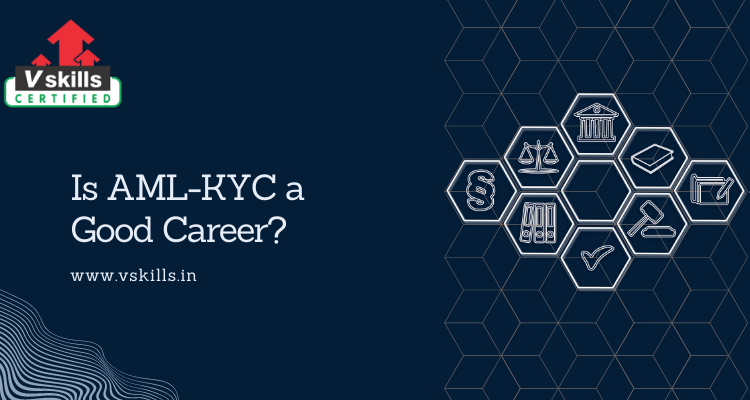Of late, one of the intriguing questions arising in the minds of most of those who aspire to make a career within the Banking and Finance domain is – “is AML-KYC a good career” to pursue. We shall try to answer most of the concern areas here in the following sections by splitting the above question in two parts – First, we shall see What is AML-KYC, and the need for it. Next, we will discuss the opportunities with a career in AML-KYC, the Scope and Learning involved, Qualifications and Skills Required, Roles and Responsibilities, the salary scenario in India, the need for Training, and finally provide some guidelines on How to Prepare for your next AML-KYC role.
The Concept: What is AML-KYC?
“Prevention is Better than Cure” is a proverb one would have come across umpteen number of times in life, and it is a practice we would all have followed on most occasions – including during the ongoing pandemic – or would have learned to follow through what experience and/or observation has taught us. It is the same philosophy which applies most fittingly to address the problem at hand for most of the Banks and Financial Institutions: Fighting the threat of use of banking channels by persons engaged in criminal activities.
‘Money Laundering’ is the process of bringing into the financial system, money derived from criminal activities, in a way as to conceal its illicit origin and to make it appear to be legit. From an organizational perspective, Anti-money laundering (AML) is a set of laws, efforts, controls, and processes that organizations put in place in order to uncover or prevent efforts of money laundering, and with it, achieve regulatory compliance.
Know Your Customer (KYC) – a term most of us would have already come across at some point or another, during our interactions or dealings with a Bank or other online Payment Vendors – is a part of AML, and is the means or methods by which firms establish and verify customer identity, and monitor the financial behaviour of all its customers. It is one of the steps of the AML process, and may also include such tasks as monitoring ongoing transactions, and a range of customer screening measures.
The Gravity: Need for AML-KYC
Money laundering has its negative impacts on the Economic, Political, and Societal systems at the global level. The importance of combating “money laundering” is not only for safeguarding the financial health of banks, and the concern in itself is not only of illegal money entering the financial system but to curb the widespread use of banking systems by supporters and financiers of terrorist activities globally. The objective of AML/KYC is to curtail or stop entirely the ill effects of money laundering on the society.
The Career Path: Opportunities in AML-KYC
The career path in AML-KYC and the journey from Analyst positions leading up to the position of Chief Compliance Officer can be a very exciting and promising one. This is especially true if you find the responsibilities associated with roles in the combat against financial fraud, crime, and corruption interesting and motivating. It is also a responsibility that transcends this combat, in that it involves protecting the organization’s integrity, and is also about helping honest customers establish and maintain a relationship with the organization.
Analysts are involved in and are knowledgeable about AML and KYC processes and procedures. The role involves data analysis and research and communicating the key observations from these activities. Analysts are expected to have strong verbal and written communication skills, other than time management and planning.
Compliance has more to do with meeting regulatory obligations. There is substantial variation within and across Compliance related roles, and salaries vary depending on the skill sets required for a role. Compliance roles may vary from Entry-Level Trainee Positions involving routine, familiar, and predictable work, to Compliance Officer Roles that require analytical capabilities. Senior roles may involve the need for Managerial leadership in overseeing specific compliance functions.
Moving up the ladder, Senior Managerial roles (Specialist Practitioners) would involve high-level strategic management and negotiations with the board. The career path would further lead to Strategic Leadership roles such as Director of Compliance, Head of Compliance etc., that would require significant decision-making ability, application of ethical principles, excellent communication and an expert-level understanding of planning and risk management. There are also consulting roles in the Big4 and other advisory firms, in which the pros of exposure and experience gained in a shorter time frame outweigh the cons of stiff competition of making it to the top. The possibility of growing in the consulting field in some cases may lead to owning one’s own boutique firm.
Scope and Learning: Career Requirements
Every other bank is investing heavily on its AML-KYC teams to keep up with the strict regulations that are being implemented by the government. The future possibilities of a career in AML-KYC are numerous, as advances in technology such as Artificial Intelligence and Machine Learning is expected to transform automation and digitization of the processes and customer experience.
- Qualifications and Certifications Required:
A suitable candidate would have at least a degree or post-graduation in business administration, law or related disciplines, although any graduate with the necessary skillset is accepted to relevant positions. In case the candidate does not have a Bachelor’s degree, it may be substituted in years of relevant professional experience. Having certifications in AML/KYC/Compliance are in most cases important, and undoubtedly a plus.
- Job-Specific Skills Required:
Although it is a finance and banking-related job, a thorough understanding of technological tools is necessary to succeed in an AML-KYC career. Candidates should be able to understand and gain expertise in the use of compliance software used for transactions, reporting, and monitoring. They need to have analytical, decision-making and problem-solving skills, attention to detail, communication and interpersonal skills, quick learning ability, and be well-versed in business statistics and general business terms.
Having relevant work experience and/or having pursued internship opportunities would help potential candidates boost their CV and make a strong case for that dream job.
A Day in AML-KYC: Roles and Responsibilities
AML-KYC employees work under strict office conditions, with flexibility for a work-from-home option since most work is desk-based. There is minimal to no weekend work involved. From a work nature point-of-view, candidates should be able to maintain high levels of integrity and ethics.
The Responsibilities associated with some of the AML-KYC roles are as listed hereunder:
AML Analyst:
- Monitoring and Regulating high-risk Activities
- Communicating the techniques deployed with regulators and auditors
- Reporting the organization’s overall risk mitigation performance
- Verifying that all AML regulations are met
KYC Analyst:
- Evaluation of New Account Documentation
- Review of Policies and Procedures
- Market Trend and Customer Behaviour Analysis
AML-KYC Compliance Officer:
- Determining risk level of new customer accounts
- Implementing the AML compliance policies of the Company
- Staying updated with the latest regulations and laws in AML
- Taking protective & proactive measures against money laundering and threat to the company
- Detecting and reporting suspicious transactions
- Communicating and Training Staff against money laundering
Salary
- AML-KYC Analyst Salaries in India may vary from 2.5 lacs to 8.4 lacs, with the national average salary being around 4 lacs.
- Compliance Analysts are paid anywhere between 2.4 lacs to 7.2 lacs, with the national average salary of about 4.5 lacs.
- Compliance Officers may expect salaries upward of 3.2 lacs, with the national average being around 6.7 lacs.
These salaries may vary based on the experience level of the candidate, the company requirements, and the candidate’s interview performance.
The Challenges: Need for Training
Globalisation of Banking and Finance, and Technological advances in payment systems have added to the plethora of channels and ways to conceal criminal money. It has also increased the mobility of such funds across borders. Lack of preventive measures would expose Banking and Financial institutions to reputation risk and loss of public confidence, risk of fraud, and economic crime.
The impacts can have far-reaching effects on the stability of the financial systems of a country. Banks and Financial Institutions would also face strict actions for any carelessness in performing control checks to prevent criminal money from entering their systems. Thus, it is vital for Banks and Financial institutions to train their staff on robust technology platforms for scanning transactions.
The How? – Preparing for a Career in AML-KYC
A good knowledge and understanding of Anti-Money Laundering (AML) and Know Your Customer (KYC) standards is thus essential for the employees of banks and financial institutions to remain competent and relevant for the ongoing combat against money laundering. It is thus very crucial to upgrade one’s skills for better job opportunities.
The Vskills Certified AML-KYC Compliance Officer is a certification aimed at enhancing the quality of compliance with the directions of RBI in combating illegal operations and movement of funds through the use of banking channels. It is being increasingly pursued by a large number of working professionals in the banking and finance domain, and also provides knowledge enhancement and a valuable addition to the CV for students desirous of entering banking and finance sector.
Vskills provides practice tests and interview questions on the certification topic and also runs its flagship internship programme where selected interns get to work with the academic council.




